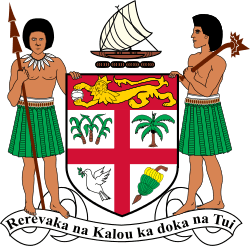Open constituencies (Fiji)
 |
| This article is part of a series on the politics and government of Fiji |
| Constitution |
|
Legislative |
| Judiciary |
|
|
Politics portal |
Open constituencies represent one of several electoral models employed in the past and present in the Fijian electoral system. They derive their name from the fact that they are "open": unlike the communal constituencies, the 25 members of the House of Representatives who represent open constituencies are elected by universal suffrage and are open to members of any ethnic group.
Universal suffrage with a common voters' roll was first proposed by the Indo-Fijian-dominated National Federation Party (NFP) in the early 1960s, but was opposed by most leaders of the indigenous Fijian community, who were fearful that a common roll would favour Indo-Fijians, who then comprised a majority of the population. The proposal came up again intermittently throughout the 1970s, but nothing came of it.
Open constituencies came into being when the present constitution was adopted in 1997-1998. The Constitutional Commission chaired by former New Zealand Governor General of New Zealand Sir Paul Reeves had recommended a total of 45 open and 25 communal constituencies, but the then-ruling Fijian Political Party of Prime Minister Sitiveni Rabuka and the opposition NFP saw the communal constituencies allocated to indigenous Fijians and Indo-Fijians respectively as their power base and insisted on virtually reversing the ratio. The final constitutional draft established 46 communal constituencies and 25 open constituencies, which are required to be substantially equal in population.
Most political competition in Fiji takes place in the open constituencies. As the fundamental faultline in Fijian politics remains ethnic rather than ideological, the racially allocated communal constituencies generally follow predictable voting patterns. The ethnically diverse open constituencies, particularly in urban areas, are much more competitive.
The existence and number of the open constituencies remains a bone of contention in Fijian politics. Many Fijian ethno-nationalists favour their abolition, whereas many Indo-Fijian politicians like former Prime Minister Mahendra Chaudhry, as well as parties claiming to be multiracial, argue that their number should be increased, or even that all parliamentary seats should be open.